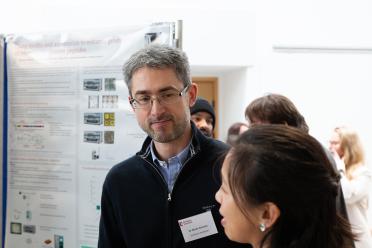
The programme - designed to build a vibrant and skilled community of researchers and professionals - will lead the way in embedding FAIR (Findable, Accessible, Interoperable, Reusable) data and workflow practices across the life sciences.
Modern science involves the generation of vast amounts of data. The ability to collect, store, and interrogate more and more data is empowering us to ask new research questions and make discoveries that would have previously been unimaginable.
However, scientists around the world are using a myriad of tools, pipelines, and data standards. Without a universal approach, data can’t be easily accessed, understood, or shared.
The BioFAIR Fellowship brings together a diverse group of individuals from across the UK life sciences ecosystem, at varying career stages, to drive sustainable cultural change in data management.
The goal of the inaugural fellows is to work as a team to create widespread collaboration and outreach - whether regional or scientific domain - to identify and address challenges in data workflows, engaging with researchers who are not already adopting FAIR practices.
Dr Nicola Soranzo, Galaxy Platform Development Officer at the Earlham Institute is one of the first ten fellows and aims to work with the UK Galaxy community.
Galaxy is a web-based platform designed for reproducible data analysis. It seamlessly integrates a range of diverse tools in a coherent user interface, allowing users to easily manage and run complex workflows.
"Originally developed purely for computational biology, Galaxy use has expanded into multiple disciplines including humanities, physics, chemistry, and other omics sciences, with researchers across public sector universities and institutes.This makes it an ideal environment to connect existing Galaxy users with the principles of BioFAIR.
“We will be working with Galaxy users in the UK to draw out individual, localised workflows that could be pooled together to create a set of best practice analysis pipelines,” Nicola said.
BioFAIR aims to empower Fellows to become champions and connectors for FAIR data and workflows, strengthening links between practices in research, technology, and infrastructure.
Tony Burdett, Director of BioFAIR UK said: “The fellowships represent our first critical step towards creating a FAIR culture change across the UK. BioFAIR is people-led, and as we work towards growing an commons ecosystem of data and methods services, it was really important to us to start by building a diverse network of technical professionals who can embed these principles within their regional and scientific communities.
“The fellows will act as ambassadors for BioFAIR, advocating for best practice and helping to gain a better picture of what the life sciences community needs to accelerate data-driven and FAIR research.”
In addition to Nicola, the Fellowship includes scientists from Cardiff University, University of Dundee, UK Dementia Research Institute, Quadram Institute, University of Exeter, Wellcome Sanger Institute, Queens University Belfast, Open University and UCL, who, together, will foster a sustainable network of experts driving cultural change to embed these practices from the ground up.
BioFAIR was launched in 2024 with a £34m investment from UK Research and Innovation (UKRI) through BBSRC and the MRC, to transform how UK scientists facilitate research data management.
Fundamental to the BioFAIR concept are its BioCommons, covering data, methods, and people, with each one driving a key component of the project.
By better connecting research teams and championing the reuse of data and methods, BioFAIR will help accelerate research, leading to faster scientific breakthroughs as a result.
From a coordinating hub at the Earlham Institute, BioFAIR is delivered by a distributed network of UK partners responsible for project leadership and delivery.


